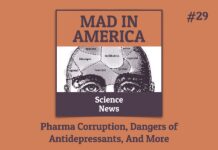Massachusetts Bill HD.4554, also named “An Act relative to benzodiazepines and non-benzodiazepine hypnotics,” needs to gain sufficient state representative support by Tuesday, March 1, 2016 so it can then come before the appropriate committee for an official vote. Only five days away!
What is Bill HD.4554?
This bill will put restrictions on the prescribing of benzodiazepines and non-benzodiazepine sleep aids. It will require that all patients be informed of the potential dangers of these drugs, specifically the dangers of long-term use. If the bill passes, many people will be spared from the unnecessary and long-term suffering that taking prescribed benzodiazepines and sleep aids can cause.
Benzodiazepines are tranquilizers including: Ativan, lorazepam, clonazepam, Klonopin, Xanax, alprazolam, Restoril, Valium, and many others. This bill will also regulate sleep drugs like Ambien, Lunesta, and Sonata. These are some of the most commonly prescribed drugs in the world today, and there is currently little acknowledgement of their dangers.
What are the specifics of Bill HD.4554?
- Anyone receiving a benzodiazepine prescription will receive written informed consent from their doctor stating the risks of taking this class of drugs. The consent form will ensure that patient’s understand that benzodiazepines and sleep aids can lead to physical dependence, and in some cases, addiction. The informed consent form will also specify that this drug can, in some cases, cause an injury to the nervous system and dangerous and/or disabling withdrawal reaction. The consent form will also specify that long-term use is contraindicated.
- Benzodiazepine prescriptions will be written on brightly colored paper to ensure that patients know that they are receiving a potentially harmful substance that could lead to physiological dependence or addiction.
- No patient will be taken off benzodiazepines or sleep aids without their full consent. No patient will be “cold turkeyed” off their prescription. For patients choosing to come off, a safe taper schedule will be implemented.
- Drug labels will also specify that long-term use is contraindicated.
If the bill passes, and the prospects are looking good, a committee will be established to set up a safe tapering protocol. Doctors will be mandated to follow this protocol and will no longer be able to haphazardly taper or “cold turkey” their patients off benzodiazepines. The committee will include doctors and representatives from the psychiatric recovery community, and will pull from pre-existing tapering protocols such as the Ashton Manual.
Why Is this Bill Important?
The general public needs to be informed about the risks they are taking by using benzodiazepines and sleep aids.
Benzodiazepines have been linked with: PAWS (post-acute withdrawal syndrome), increased risk of developing Alzheimer’s disease and dementia, increased risk of falls and confusion in elderly patients and deadly seizures if stopped abruptly. In addition, a recent study found that 30% of all opiate overdoses resulting in death were found to include benzodiazepines in toxicology reports. This link between drug overdose deaths, particularly those involving opiods, and benzodiazepine use has been reported in a number of major news outlets in recent months.
Benzodiazepines can cause long-term damage to the central nervous system, and in 10-30% of long-term users (defined by the makers of Ativan as more than 2-4 weeks), recovery can last from months to several years after cessation.
Prescription guidelines, as outlined by the manufacturers of Ativan:
“In general, benzodiazepines should be prescribed for short periods only (e.g., 2-4 weeks). Extension of the treatment period should not take place without re-evaluation of the need for continued therapy. Continued long-term use is not recommended. Withdrawal symptoms (e.g., rebound insomnia) can appear following cessation of the recommended dose after as little as one week of therapy. Abrupt discontinuation of product should be avoided and a gradual dosage-tapering schedule followed after extended therapy.”
The “benzo community,” those who have been harmed by taking benzodiazepines as prescribed, has been trying for years to get the FDA to acknowledge that benzodiazepines are potent and dangerous medications that can lead to disability and dependence. We have petitioned for a black back warning, but that petition was denied by the FDA in 2010 despite extensive research and evidence showing the dangers of this class of drugs, and despite the fact that there’s been an awareness about these issues since at least 1979 when Ted Kennedy led a senate subcommittee investigation into the drugs’ dangers. This bill is our chance to be heard.
If the bill passes in Massachusetts, hopefully other states will follow suit and it will eventually become a federally mandated law.
How You Can Help
Anyone who lives in or knows someone from Massachusetts can help this bill pass. If you live in Massachusetts, email and call your state representative and senator before 5pm on Tuesday, March 1st. Let them know that you support Paul McMurtry’s Bill HD.4554, and that you hope that they will, too. Explain to them the damage benzodiazepines have done to you or your loved one, and how the careless prescribing of benzodiazepines has become a public health epidemic.
If you are not a resident of Massachusetts, reach out to family and friends who live in Massachusetts and ask them to contact their state representative and senator.
This following link can be used by Massachusetts residents to determine their appropriate state representative: http://www.wheredoivotema.com/bal/MyElectionInfo.aspx
Thank you for your support!
* * * * *
Video assembled and edited by A. M. Demaris
* * * * *
https://www.youtube.com/watch?v=599w9OAH4jg
Video by Ally Nugent















No one told me what was in store when starting clonopin, I had no idea. I though addiction was falling in love with a drugs effects, I knew nothing about withdrawal reactions, no one told me, no warning on the package insert describing that part. I heard cocaine and crack is addictive with people taking a liking to the euphoria it produces. That was my understanding of addiction and I associated that word with street drugs. I took the Clonopin and it was not such a great feeling, honestly beer is a better feeling so I kind of wondered how anyone could become “addicted” to that stuff. The first time I ran out of clonopin I quickly learned what happens and what that term “habit forming” actually means. The years that followed , panic attacks ER visits drug rehabs… I did the benzo nightmare.
I would be really interested in argument against informed consent by the lobbyists from the psychiatric and pharmaceutical industries.
In 2004, drug company funded NAMI opposed the placement of “black box” warnings on antidepressants determined to cause suicide in under-18 year olds, and in 2006 opposed black box warnings on ADHD drugs causing heart attack, stroke and sudden death in children in 2006. Despite overwhelming evidence of serious adverse cardiac events and sudden deaths caused by ADHD drugs, in 2006 NAMI took the position that the “black box” warning on ADHD drugs was “premature.”
Lets see what happens, I don’t think anything scares the psychiatric pharmaceutical industry more than requirements for informed consent. Knowing what I know now I would never have gone near them… They have the money to send their best people to argue against informed consent and they donate a ton of money to politicians.
This law will save the system money if it passes. My “treatment” must have cost a few hundred thousand dollars with all the ER visits inpatient psych nightmares and drug treatment centers.
Much of the money spent on my treatment was related to attempts to force me to quit before I was ready, traumatizing me with rapid withdrawals strengthening my resolve that I “needed” those pills so even if I had chosen to take the drug fully informed this law would have saved alot because dependence is much less of a nightmare if your supply is not messed with.
They have no idea even how to taper people properly from this stuff, why do those clowns give you the last pill in the morning so that night you rebound and cant sleep ?? First you cut the day doses for a wile, learn to make it all day without it, then work on the night doses. Thats to logical for those clowns posing as experts with “knowledge” that wrap people up in the psychiatric nightmare to start with.
Report comment
I forgot to write about one of my ‘favorite’ parts of the Benzodiazepine nightmare.
Step one: They get people hooked on these drugs without telling them the dangers.
Step two: They send you to drug rehab and tell you to raise your hand and say “I am an addict” before speaking.
You just have to love the blame the victim part of step 2 “I am an addict” … The psychiatric pharmaceutical industry had nothing to do with it ??!!!!
Anyone reading this goes of to treatment for benzos instead of saying “I am an addict” try saying I “Hi my name is ______ and I was mislead by the greediest sociopaths on the face of the earth, the psycho pharmaceutical industry.”
Report comment
This is good stuff. I particularly appreciate the emphasis on *not* allowing sudden tapers and such. I was Rx’d Klonopin as a teenager. At a certain point, my doc decided I needed to stop, so she did a rapid taper. I was miserable; she kept tapering and called me a “drug seeker” and an “addict.” She, of course, was the one who had kept an 18-19 year old on full dose Klonopin, plus Ambien and Sonata, and then abruptly decided to pull the plug. I hear this happens a good bit. Hopefully, this legislation will pass and other states will follow with their own regulations.
Report comment
Benzos are good for tapering off alcohol and opiates, and pose a lesser danger, as Benzos have no known side effects. It’s true 50% of people get addicted, which is why a taper is good, as well as blood tests to ensure no confounding variables are present during detox. … informed consent should be up to the patient, not the Government nanny state.
Report comment
I get that. I don’t dig that war on drugs thing that’s turned our country into a police state complete with more people prison than any other country on earth.
When we talk about informed consent we mean this >>> http://laingsociety.org/colloquia/polofdiagnosis/modelconsent.htm
Liberty is my thing too but you can’t go around selling poison without telling people it IS poison. You can’t sell bottled water with lead in it wile telling people its pure or safe to drink.
This is a tough one cause you are right that it is a personal responsibility to inform yourself but I am sticking with the above that liberty doesn’t include the right to harm others to poison them or to knowingly give uninformed people drugs without first warning them of what they do.
https://en.wikipedia.org/wiki/Harm_principle
Report comment
Benzodiazepines have many known side-effects and withdrawal effects. The insert for Ativan (lorazepam) states:
“The use of benzodiazepines, including lorazepam, may lead to physical and psychological dependence… In general, benzodiazepines should be prescribed for short periods only (e.g. 2- 4 weeks). Extension of the treatment period should not take place without reevaluation of the need for continued therapy. Continuous long-term use of product is not recommended.
Withdrawal symptoms (e.g. rebound insomnia) can appear following cessation of recommended doses after as little as one week of therapy. Abrupt discontinuation of product should be avoided and a gradual dosage-tapering schedule followed after extended therapy. Abrupt termination of treatment may be accompanied by withdrawal symptoms.
Symptoms reported following discontinuation of benzodiazepines include headache, anxiety, tension, depression, insomnia, restlessness, confusion, irritability, sweating, rebound phenomena, dysphoria, dizziness, derealization, depersonalization, hyperacusis, numbness/tingling of extremities, hypersensitivity to light, noise, and physical contact/perceptual changes, involuntary movements, nausea, vomiting, diarrhea, loss of appetite, hallucinations/delirium, convulsions/seizures, tremor, abdominal cramps, myalgia, agitation, palpitations, tachycardia, panic attacks, vertigo, hyperreflexia, short-term memory loss, and hyperthermia. Convulsions/seizures may be more common in patients with pre-existing seizure disorders or who are taking other drugs that lower the convulsive threshold such as antidepressants.
There is evidence that tolerance develops to the sedative effects of benzodiazepines.”
Tolerance means that the individual could experience the withdrawal symptoms stated above while they are still on the drug. The individual would need a higher dose of the drug to receive the drug’s initial effect.
Here is a pertinent link which discusses the many side-effects and dangers of benzodiazepines. http://www.benzo.org.uk/sidefx.htm
Report comment
Alison, one thing — You should reconsider your use of the term “side-effects” as it is a pharmaceutical misnomer at the least. Whatever a drug does to you constitutes it’s effects. The fact that a particular effect is not the one the drug is prescribed for, or doesn’t sound good in a TV ad intended to sell the drug, does not make it less of an effect, which is often implied by the term “side”-effect.
As to the “right” to take pharmaceuticals, it’s a dubious “right,” comparable to the “right” to suicide, but it does exist. Still there’s a big difference between smoking marijuana or using opium and taking pharmaceutically-designed drugs that are manufactured specifically to serve corporate and governmental ends, and advertised using fraudulent medical terminology to deceive people into becoming dependent on them.
Report comment
And also, thanks for your activism around this!
Report comment
Alison
This bill represents an important beginning step in exposing the dangers of benzodiazepines and in supporting safer withdrawal for the high number of people harmed by iatrogenic dependence.
Hopefully this activism can lead to even greater efforts to expose the totality of the crimes of Big Pharma and Psychiatry relative to the benzodiazepine crisis, including the potentially explosive connection to opioid overdose epidemic.
I am so glad you repeated the statistic that at least 30% of all fatalities from opiate overdoses involve benzos. In fact benzos may often be THE decisive component in these deadly drug cocktails. Credible statistics indicate that 60% of all people who use legal and illegal opiates also use benzos on a daily or regular basis. This sets up the material conditions for the “perfect storm” of addiction where death always lurks very close by.
The reckless prescribing of this category of drug has enormous negative consequences throughout our society; so many different sectors of people are seriously harmed. The more of these sectors who speak out and become active the greater our chances for success in uniting our efforts and advancing our cause.
Thank you for speaking out and fighting this cause.
Richard
Report comment
Leo Henryk Sternbach (May 7, 1908 – September 28, 2005) was a Croatian-born Polish American chemist who is credited with discovering benzodiazepines, the main class of tranquilizers.
https://en.wikipedia.org/wiki/Leo_Sternbach
I wonder if he was taking his own invention.
Report comment
Horrible! I’ve been taking very low dose ativan for a sleep disorder for over a decade. Stop trying to micromanage everyone’s drugs. All drugs are dangerous and you should never take more than you need and there are risks to all of them. This is just another witch hunt against vulnerable patients. It is truly MAD and will only cause more overdoses and deaths. Not surprising this comes out of MA.
Report comment